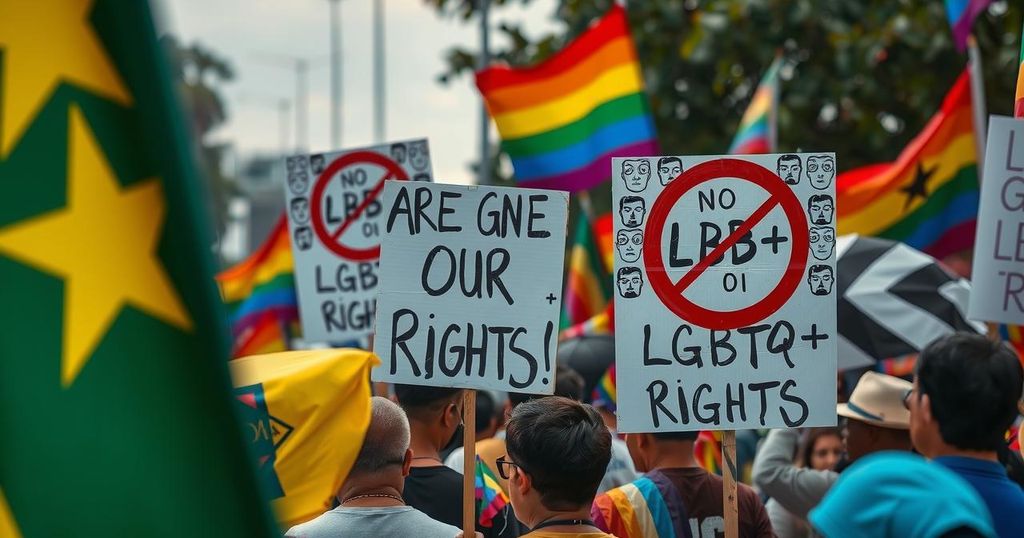Ghana Elections Intensify Threats to LGBTQ+ Rights Amid Political Climate
Ghana’s elections risk worsening the plight of LGBTQ+ individuals as candidates align with anti-LGBTQ+ sentiments, promising to enforce severe penalties through a recently passed bill. The ruling party aims to criminalize LGBTQ+ identities, while public attitudes remain predominantly hostile. The upcoming Supreme Court ruling will be crucial in impacting the legal status of LGBTQ+ rights in the country.
In Ghana, the LGBTQ+ community is confronted with a disheartening scenario as they prepare for the upcoming general elections on December 7. All leading presidential candidates have pledged to intensify crackdowns on LGBTQ+ rights amid pervasive negative public sentiment. The succeeding government will likely either endorse or reject a controversial bill passed by Parliament, which mandates severe penalties for individuals identifying as LGBTQ+, including potential imprisonment for up to five years for same-sex activities.
The ruling party candidate, Mahamudu Bawumia, remains steadfast in his intention to sign this legislation into law. In contrast, the opposition leader, former president John Dramani Mahama, although not committing to sign the bill, has publicly supported stricter laws against LGBTQ+ activities, alleging Western influence in promoting homosexuality within Ghana. This political stance has left individuals like Abena, a member of the LGBTQ+ community, feeling significantly marginalized and unsafe as the electoral process unfolds.
Ghana already criminalizes homosexual acts, and the proposed bill exacerbates the existing legal framework by broadening definitions of illegal activities and escalating punishments. Furthermore, it imposes penalties not only on LGBTQ+ individuals but also on those who fail to report them, thus alienating families and friends. Abena reflects on the pain of such legislation, suggesting it divides families and forces individuals into secrecy regarding their identities.
The public’s skepticism towards LGBTQ+ rights is underscored by an Afrobarometer survey, revealing that only 7% of Ghanaians support same-sex relationships. The climate has been further inflamed by religious organizations rallying for the urgent passage of the bill, branding homosexuality as incompatible with Ghanaian cultural and religious values. Human rights advocates emphasize that the political race for anti-LGBTQ+ sentiment has become a non-issue, overshadowing critical discussions that could protect vulnerable populations.
Internationally, the proposed legislation has drawn condemnation, notably from the European Union, which warned that its passage would violate Ghana’s constitutional and human rights obligations. The Supreme Court’s impending ruling on the bill’s constitutionality raises questions about potential amendments or outright dismissal. However, the timing of this decision is critical, as Abena fears it will arrive too late for her to make an informed voting choice. She expresses trepidation about the implications of supporting candidates who leverage such legislation for political gain, fearing further criminalization and stigmatization of LGBTQ+ individuals.
The current political climate in Ghana poses a significant threat to the rights of the LGBTQ+ community. Following the introduction of a contentious bill proposing severe legal repercussions for LGBTQ+ individuals, leading political figures have capitalized on public sentiment to garner votes. With the Supreme Court set to deliberate the bill’s legality, pressure mounts on individuals from the LGBTQ+ community, compelling them to navigate a landscape rife with hostility and discrimination. Given that societal attitudes are predominantly negative towards LGBTQ+ rights, the outcome of the elections could significantly impact the future of human rights in Ghana.
In conclusion, the upcoming elections in Ghana present a precarious situation for the LGBTQ+ community, as candidates prioritize anti-LGBTQ+ sentiments to secure electoral success. The potential enactment of the proposed bill poses dire consequences for individuals within this demographic, leading to heightened persecution and fear. The Supreme Court’s decision will be pivotal in determining the trajectory of LGBTQ+ rights in Ghana, ultimately shaping the societal landscape for years to come.
Original Source: www.voanews.com




Post Comment